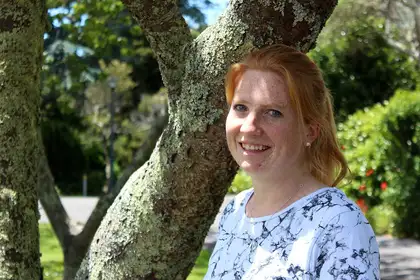
Isabel Tait.
Massey PhD student Isabel Tait was taught at a school without an agriculture class, but ended up at Massey working to advance the agriculture sector with some of the biggest companies in New Zealand.
The 24-year old from Otahuti grew up on her parent’s sheep farm, where she became interested in animals at an early age. This curiosity led her to attend Massey University with the hope of gaining selection in the professional phase of the Bachelor of Veterinary Science.
“When you’re in high school you see all these jobs like vets, pilots and lawyers and you can’t help but aim toward a well-known profession, because that’s all you know – we didn’t even have an agriculture class. I had no idea that there were other professions out there, especially all the jobs in the ag sector that were not only there for the taking, but also aligned with what I wanted to do –work with sheep.
“That’s the great thing about that first year of the Bachelor of Science, is that I was able to see that I didn’t actually want to be a vet, because the other courses opened my eyes to the amount of interesting jobs in the ag sector. I think people see agriculture jobs as unskilled, but that couldn’t be further from the truth – it's technical but you can get your hands dirty, which is kind of the beauty of it,” says Miss Tait.
She was able to pick up a number of scholarships to cover much of the costs of her study through the Beef + Lamb NZ Scholarship, Landcorp Farming First Step Bursary, Sir Alan Stewart Scholarship, Janet Murray Scholarship, George Terry Memorial Scholarship 2014, the NZ Institute of Ag and Hort Science Leading Student 2013, just to name a few.
Miss Tait says these scholarships were a huge help. “You’ve got to work hard, but because there are so many jobs in agriculture, the incentives to get people to study are also there. So you come out with a degree that employers want and a smaller student loan.”
After completing her Bachelor of AgriScience degree at Massey University, she completed her honours year, which focused on the effect of skin thickness on lamb survival.
Following this Miss Tait was involved as a Junior Research Officer for the Pastoral 21 Next Generation Dairy Systems programme, a collaborative five-year farm programme that aimed to provide proven, profitable, simple, adoption-ready systems that lifted production and reduced nutrient loss. Between Dairy NZ, Lincoln University, Telford Farm Training Institute and Massey University's No. 4 Dairy Farm.
“I was wondering what I was going to do after completing honours, and I just approached Mike Hedley and asked him if I could be involved. Mike always had an open door policy where you could approach him and he always had your best interest at heart. I’ve spoken to friends from other universities and that approachability and attention to the students isn’t always a given.
“Working on that project was a big eye-opener to the industry, but even though I was the youngest, they always supported me. I also started to see where I could apply my undergraduate learning. It’s hard to see the application of things like learning about feed budgeting when you’re doing your undergraduate, but when you actually start working in the industry, you start to use the skills and it all starts to click.”
“Around about this time I started to think that I liked the research area and I might want to stick around, but if I was going to continue in this area, I probably needed a PhD,” she says.
In October, Miss Tait decided to undertake a PhD in Animal Genetics, which took her full-circle back to the Institute of Veterinary, Animal and Biomedical Sciences, where she will be supervised by Dr Rebecca Hickson. She will be undertaking a study to understand the genetic parameters of the body condition scores of sheep and beef breeding cattle. This will involve assessing the genes that are passed along from the mother and father in terms of average body condition.
“Initially, I had no intention on doing a PhD because I couldn’t really see the point, but once I actively got involved in research I could then see the endpoint and the application of my research for the time I was going to put in.”
Miss Tait was active both in and out of the classroom throughout her study, including being a member Massey Young Farmers, Massey Maidens Rugby and the Massey Thunderbirds Soccer. This year she came second in the Manawatu District Final of the Young Farmer of the Year competition, and will compete at the Manawatu/Taranaki Regional Final in Hawera this April.
She continues the connection with others in the industry as the Opiki Young Farmers Club vice chairman.